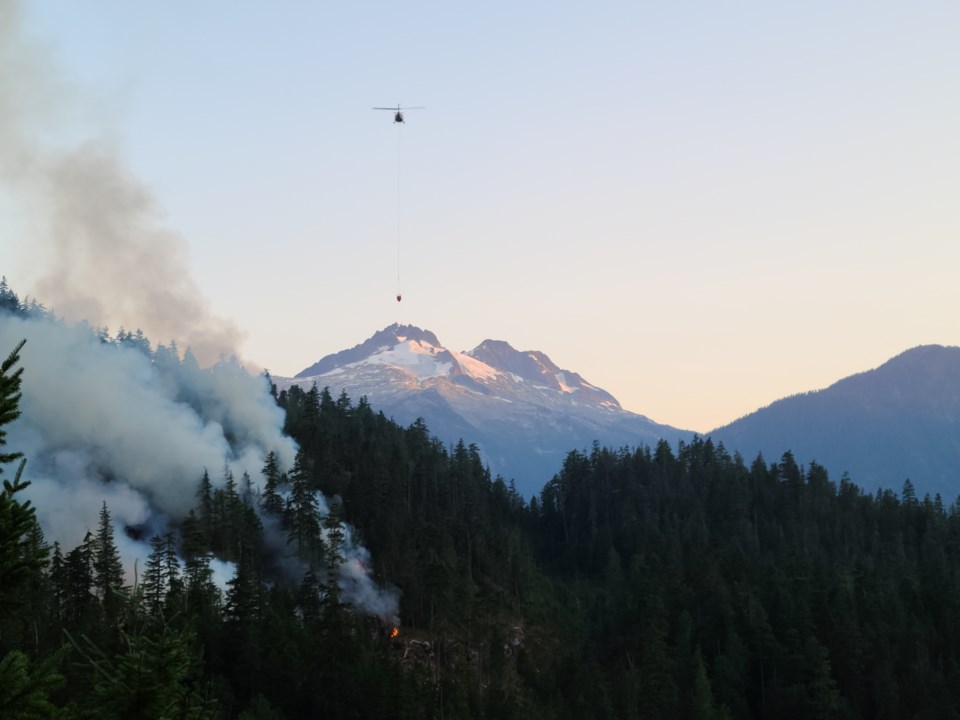A wildfire on Cloudburst Mountain south of Whistler is being held at 8.27 hectares, according to the BC Wildfire Service (BCWS), but with more hot temperatures in the forecast this weekend the public is reminded to stay vigilant on wildfire risk.
The Cloudburst fire, discovered Aug. 3 and suspected to be human-caused, had 25 BCWS crew members and one helicopter working on “mopping up” as of Aug. 9, with just three visible plumes of smoke and low fire behaviour, said Dorthe Jakobsen, fire information officer with the Coastal Fire Centre.
“They walk the ground and make sure that they don’t see anything still burning, and sometimes they’ll touch things to see if it’s hot. Fires can burn underground under fuels, so we just want to make sure that we catch everything,” Jakobsen said.
“There’s always risk of a fire spreading, and the heat and the winds haven’t helped at all, but they were able to get this to being held, which means we don’t think it’s going to grow under current conditions.”
With that in mind, “conditions can change any time,” Jakobsen added.
“There was a lot of crews working that fire to make sure that we caught it early.”
As of Aug. 10, there were 260 wildfires burning in B.C., including 22 in the Coastal Fire Centre.
Though some rain over the weekend of Aug. 6 to 8 offered a short reprieve, more high temperatures are in the forecast for Aug. 11 to 14.
On Aug. 10, Environment Canada issued a special weather statement for Whistler and the Sea to Sky, noting that a building ridge of high pressure with rising temperatures is forecast to arrive this week.
“Inland daytime temperatures are expected to reach 33 degrees with overnight minimum temperatures near or above 17 degrees,” the statement read.
“The time frame of hot weather is Wednesday to Saturday with temperatures peaking on Thursday and Friday. Pemberton and the Fraser Valley will see the highest temperatures.”
Effects of heat illness include swelling, rash, cramps, fainting, heat exhaustion, heat stroke and the worsening of some health conditions, and the risks are greater for young children, pregnant women, older adults, people with chronic illnesses and people working or exercising outdoors.
“We’re looking at warming up here throughout the week to getting absolutely hot, by the weekend, [and] these fires can get aggressive when it gets really hot, so we’re wanting to get control of these fires before it gets hot,” Jakobsen said.
“We’re not out of the woods yet, but [the rain] did help a little bit.”
The recent precipitation may have eased the anxieties of some in the corridor, as BCWS reported an increase in illegal campfires and beach fires as of late.
“There is still a campfire prohibition for the entire Coastal Fire Centre area except for Haida Gwaii, and that includes Category 2 and Category 3 fires, so no campfires, no beach fires, no fires of any size,” Jakobsen said.
“We ask that people please respect that prohibition, because it’s going to dry out really quickly here again and get really hot again. We’re also asking people to report. They’ve been doing a great job of reporting to us quickly; that’s very much appreciated, so please keep it up—the sooner we get to a fire the sooner we can get it under control.”
After dipping into moderate this week, Whistler’s fire danger rating is currently forecasted to return to extreme and stay there for at least the next three days.
As of Aug. 5, all CSA approved portable propane campfires are no longer allowed in Whistler when the fire danger rating is extreme.
Report fires in Whistler by calling 911. Outside of Whistler, call *5555 on a cell phone or 1-800-663-5555.





